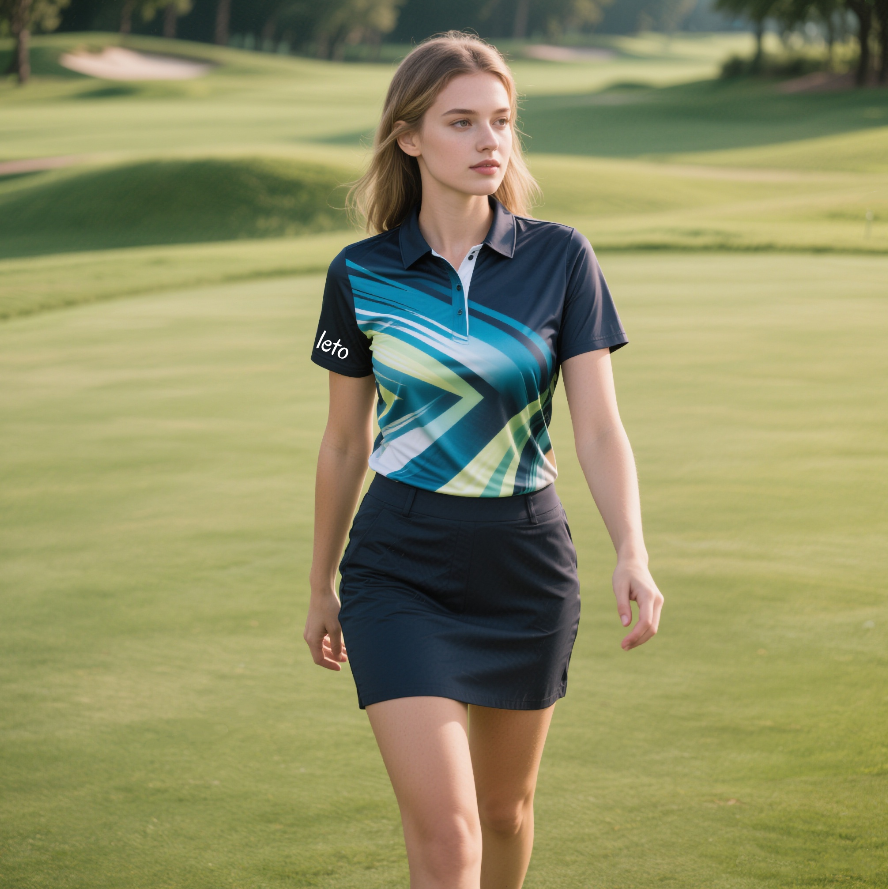The golf apparel industry has reached a pivotal moment in 2025, with the global market valued at over $4.8 billion and continuing to expand at an impressive rate. For Golf Apparel Startups, procurement managers, and fashion buyers, selecting the right Golf Clothing Supplier has become more critical than ever. The success of your golf apparel line depends heavily on partnering with a manufacturer that understands both the technical requirements of athletic performance and the evolving demands of modern golfers.
Understanding the Modern Golf Apparel Landscape

The contemporary golf clothing market has shifted dramatically from traditional cotton polos to high-performance, technology-driven garments. Today's golfers demand apparel that combines style, comfort, and functionality while increasingly prioritizing environmental responsibility. This evolution has created new challenges for Golf Clothing Manufacturers who must balance innovation with cost-effectiveness and sustainability.
Professional custom golf sportswear suppliers must demonstrate expertise across multiple domains: fabric technology, manufacturing efficiency, quality control, and customization capabilities. The ability to produce everything from low MOQ golf apparel, 50 pieces for emerging brands, to large-scale production for established companies has become a defining characteristic of industry leaders.
Essential Criteria for Supplier Selection
1. Manufacturing Capabilities and Infrastructure

When evaluating potential partners, the first consideration should be their manufacturing infrastructure. A professional Golf Clothing Manufacturer should possess comprehensive production capabilities, including cutting-edge equipment for fabric cutting, sewing, and finishing processes. The presence of advanced printing and embroidery facilities is crucial for Custom Logo Sport Golf Shirt production and Custom Embroidered Golf Polo Shirts.
Efficient Manufacturing processes are essential for meeting delivery timelines and maintaining cost competitiveness. Look for suppliers who have invested in modern production lines that can handle diverse fabric types, from traditional polyester blends to innovative materials like graphene-infused golf wear temperature control fabrics. The ability to seamlessly transition between different production requirements demonstrates operational flexibility and expertise.
2. Quality Assurance and Testing Standards

Professional suppliers must maintain rigorous quality control systems that ensure consistent product standards across all production runs. This includes adherence to international testing protocols such as AATCC 183 UV test methodology, which verifies the UV protection properties of golf apparel–a critical safety consideration for outdoor athletic wear.
For 4-way stretch golf pants ISO 13934 compliance, suppliers should demonstrate their ability to test and verify stretch properties according to international standards. This technical capability is particularly important for performance-oriented garments where fabric behavior directly impacts athletic performance.
Quality assurance extends beyond fabric testing to include construction quality, dimensional stability, and durability assessments. A BSCI audited golf wear factory certification indicates that the manufacturer meets international social and environmental standards, providing additional assurance of their commitment to responsible manufacturing practices.
3. Customization and Design Flexibility

The ability to provide Custom Golf Wear Solutions is fundamental to modern golf apparel manufacturing. This encompasses everything from basic logo placement to complex design modifications and unique fabric combinations. Suppliers should demonstrate proficiency in handling various customization requests, from embroidery golf hat minimum quantity orders to complex multi-color designs.
For country club uniform redesign case study projects, manufacturers should show experience in working with institutional clients and understanding their specific requirements for consistency, durability, and professional appearance. The ability to translate design concepts into production-ready specifications while maintaining quality standards is essential.
4. Fabric Technology and Innovation

Modern golf apparel demands sophisticated fabric technologies that address performance, comfort, and environmental concerns. Professional suppliers should offer access to Premium Golf Fabrics that incorporate advanced features such as moisture-wicking, UV protection, and temperature regulation.
The availability of innovative materials like graphene-infused golf wear temperature control fabrics demonstrates a supplier's commitment to staying at the forefront of textile technology. Similarly, the ability to produce non-restrictive golf polo full swing mobility garments requires an understanding of how fabric stretch and recovery properties affect athletic performance.
For brands focusing on sustainability, suppliers should offer comprehensive options for Eco-friendly golf apparel for environmentally conscious brands. This includes access to recycled materials, organic cotton golf wear supplier for eco-conscious retailers, partnerships, and manufacturing processes that minimize environmental impact.
Specialized Requirements for Different Market Segments

Ladies' Golf Apparel Considerations
The ladies' golf apparel market has unique requirements that professional suppliers must understand and accommodate. Ladies' golf apparel brands often require more complex sizing matrices, diverse style options, and fashion-forward designs that balance performance with aesthetic appeal.
Suppliers working with Unique ladies' golf apparel brands should demonstrate expertise in creating garments that flatter diverse body types while maintaining the technical performance characteristics essential for golf. The ability to produce cute golf outfits for ladies that don't compromise on functionality requires sophisticated design and manufacturing capabilities.
For luxury golf apparel brands' ladies collections, suppliers must meet higher standards for fabric quality, construction precision, and finishing details. This market segment often requires specialized techniques and premium materials that not all manufacturers can provide.
Sustainable and Eco-Friendly Manufacturing

Environmental consciousness has become a significant factor in supplier selection. A recycled golf apparel supplier should demonstrate comprehensive sustainability practices, from material sourcing to waste management. This includes the ability to work with recycled polyester, organic cotton, and other environmentally friendly materials without compromising performance or quality.
Sustainable Golf Apparel manufacturing involves more than just using eco-friendly materials. It requires implementing energy-efficient production processes, reducing water consumption, and minimizing waste throughout the manufacturing cycle. Suppliers should provide transparency about their environmental practices and offer certifications that verify their sustainability claims.
Climate-Specific Performance Requirements

Golf is played in diverse climatic conditions, requiring specialized apparel solutions for different environments. For tropical golf destinations, suppliers should offer expertise in sweat-resistant golf wear for tropical climates, incorporating advanced moisture management systems and breathable fabric constructions.
For coastal golf courses, a windproof golf jacket for coastal tournaments becomes essential. Suppliers should demonstrate their ability to create garments that provide wind protection while maintaining the flexibility and comfort required for golf performance.
Technology Integration and Innovation
Advanced Fabric Technologies
Professional suppliers should stay current with emerging fabric technologies that enhance golf performance. This includes understanding how different fiber blends affect garment behavior, durability, and comfort. The ability to recommend optimal fabric combinations for specific applications demonstrates technical expertise and customer service commitment.
Innovative Golf Fashion often incorporates cutting-edge materials and construction techniques. Suppliers should show evidence of their ability to work with new technologies and adapt their manufacturing processes to accommodate innovative design concepts.
Manufacturing Technology and Equipment

Modern golf apparel manufacturing requires sophisticated equipment for precision cutting, automated sewing, and advanced finishing processes. Suppliers should invest in technology that ensures consistent quality while maintaining production efficiency.
The presence of advanced embroidery and printing equipment is essential for Custom Embroidered Golf Apparel production. This includes the capability to handle complex designs, multiple color applications, and various decoration techniques that meet diverse customer requirements.
Quality Control and Testing Protocols
Performance Testing Standards
Professional suppliers must maintain comprehensive testing protocols that verify garment performance across multiple criteria. This includes colorfastness testing, dimensional stability assessments, and durability evaluations that ensure products meet customer expectations throughout their lifecycle.
For lightweight golf vest tournament legal design requirements, suppliers should understand competition regulations and ensure their products comply with official tournament standards. This technical knowledge is crucial for brands targeting competitive golf markets.

Consistency and Reliability
Consistent quality across production runs is essential for brand reputation and customer satisfaction. Suppliers should demonstrate their ability to maintain quality standards regardless of order size, from small custom orders to large-scale production runs.
The ability to provide detailed quality reports and production documentation helps brands maintain their own quality standards and provides transparency throughout the manufacturing process.
Service Excellence and Customer Support
Communication and Collaboration
Professional suppliers should provide excellent customer service throughout the entire production process. This includes clear communication about timelines, regular progress updates, and proactive problem-solving when issues arise.
The ability to work collaboratively with design teams, providing technical input and manufacturing expertise, adds significant value to the supplier relationship. This partnership approach often leads to better product outcomes and more efficient production processes.

Flexibility and Responsiveness
The golf apparel market can be unpredictable, with seasonal variations and changing consumer preferences affecting demand patterns. Suppliers should demonstrate flexibility in accommodating order changes, rush deliveries, and seasonal production requirements.
For Golf Apparel Startups, this flexibility is particularly important as new brands often need to adjust their strategies based on market feedback and sales performance.
Evaluating Potential Suppliers
Due Diligence Process
When evaluating potential suppliers, conduct thorough due diligence that includes facility visits, reference checks, and sample evaluations. This process should verify the supplier's claims about their capabilities, quality standards, and production capacity.
Request detailed information about their client base, production volumes, and specialization areas. Understanding their experience with similar projects and market segments provides insight into their suitability for your specific requirements.
Sample Development and Testing
Professional suppliers should provide comprehensive sample development services that allow you to evaluate their capabilities before committing to large orders. This includes the ability to create samples in various sizes, colors, and fabric combinations.
The sample development process should include detailed specifications, construction details, and performance testing results that demonstrate the supplier's attention to detail and quality standards.
Long-term Partnership Considerations

Scalability and Growth Support
As your golf apparel brand grows, your supplier should be able to scale production accordingly. This includes the ability to handle increased order volumes, expand product lines, and adapt to changing market requirements.
Professional suppliers should demonstrate their capacity for growth and their commitment to long-term partnerships rather than just individual transactions.
Innovation and Development Support
The best suppliers act as partners in product development, providing technical expertise and innovative solutions that enhance your competitive advantage. This includes staying current with market trends, emerging technologies, and consumer preferences.
Conclusion: Building Successful Partnerships

Selecting the right professional custom golf sportswear supplier is a critical decision that impacts every aspect of your brand's success. The ideal partner combines technical expertise, manufacturing excellence, and service quality to deliver products that exceed customer expectations while meeting business objectives.
The golf apparel industry's continued evolution demands suppliers who can adapt to changing requirements while maintaining the highest standards of quality and service. By carefully evaluating potential partners against these criteria, golf apparel brands can build relationships that support long-term success and growth.
Professional suppliers like Leto Golf Manufacturing exemplify the qualities that define excellence in custom golf sportswear production. Their commitment to quality, innovation, and customer service creates partnerships that enable brands to thrive in an increasingly competitive market.
The future of golf apparel depends on the collaboration between innovative brands and skilled manufacturers who share a commitment to excellence, sustainability, and customer satisfaction. By choosing the right supplier partner, golf apparel brands can focus on what they do best while ensuring their products meet the highest standards of quality and performance.
Post time: 25-07-15








